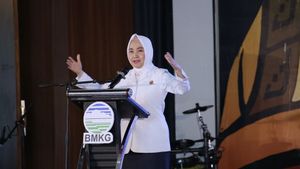JAKARTA - The government plans to launch a digital nomad visa to facilitate tourists while working remotely in Indonesia.
This digital nomad will welcome a work system where workers can work anywhere with existing technology.
While this digital trend provides many conveniences for individuals and businesses, potential security vulnerabilities should be a top priority to address.
Freedom from the corporate perimeter can pose serious cybersecurity risks ranging from using public Wi-Fi, recurring phishing issues, infected routers, outdated software, and even losing work devices.
Global cybersecurity firm Kaspersky has released its latest threat analysis for Indonesia to take a look at the risks that exist online and offline and how businesses, individuals and government agencies can combat this cybercrime while embracing digital trends like WFA (work from anywhere).
Kaspersky's latest statistical data shows that 11,083,474 online threats on the internet were successfully blocked by computers from KSN participants in Indonesia during the period from April to June this year.
Decline in online threats in the second quarter of 2022During this period, Kaspersky products detected 11,083,474 cyber threats on the computers of KSN participants in Indonesia. Overall, 25.2 percent of users were exposed to online threats originating from websites in this period.
This puts Indonesia in 69th place worldwide in terms of associated threats from surfing the internet.
However, there is good news where the number has decreased compared to last year, with a total of 18,488,946 threat detections. This figure is also seen to decrease by 6.09 percent compared to 11,802,558 detections in the first quarter of 2022.
Exploitation of vulnerabilities in browsers, plugins (download by drive) and social engineering are still the main methods for cybercriminals to maliciously penetrate systems.
Also reduced detection of local threatsThe same trend is found in malware that spreads via removable drives, USBs, CDs and DVDs, and "offline" methods.
During the second quarter of this year, Kaspersky products detected 13,533,656 local incidents among KSN participants in Indonesia. Where, around 24.71 percent of users in Indonesia have been exposed to local online threats during this period.
This represents a decrease of 17.8 percent compared to 17,975,442 detections in the same period last year and also places Indonesia in 66th position in the world in terms of local threats.
In addition, a slight decrease of 3.66 percent was also seen when compared to 14,047,376 detections during the January - March 2022 period (first quarter 2022).
“The decline in online and offline threats detected in Indonesia should not be used as a reason to stop being vigilant. We must always pay attention, especially when the WFA trend is rife, making us increasingly dependent on the internet," said Yeo Siang Tiong, General Manager for Southeast Asia at Kaspersky.
Despite the seemingly good results for the second quarter, it should be noted that the quality and impact of attacks is improving, so it is important that we maintain a high level of security.
To improve enterprise security, Kaspersky recommends the following:
Educate all employees about cybersecurity through cyber awareness training. Setting up access levels, granting access permissions only to those who really need it at each level. Supports the use of unique passwords in the work environment and keeps it from being accessed by many people. Keep backups of important data, and update IT equipment regularly. For timely endpoint detection, investigation and repair of incidents, Kaspersky recommends implementing an EDR solution. In addition to the importance of adopting endpoint protection, it is also important to implement a corporate-level security solution that detects advanced threats at the early-stage network level. Incorporating a global threat feed into their system can provide deep visibility into cyberthreat targeting organizations such as Kaspersky Threat Intelligence.The English, Chinese, Japanese, Arabic, and French versions are automatically generated by the AI. So there may still be inaccuracies in translating, please always see Indonesian as our main language. (system supported by DigitalSiber.id)








